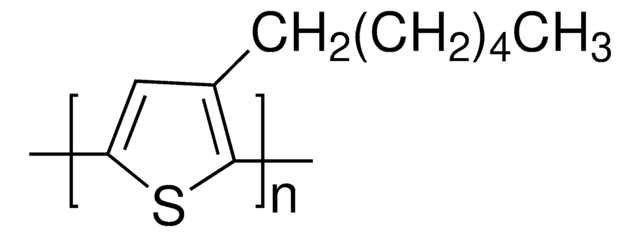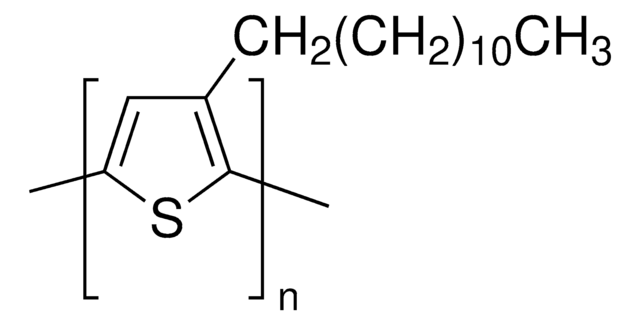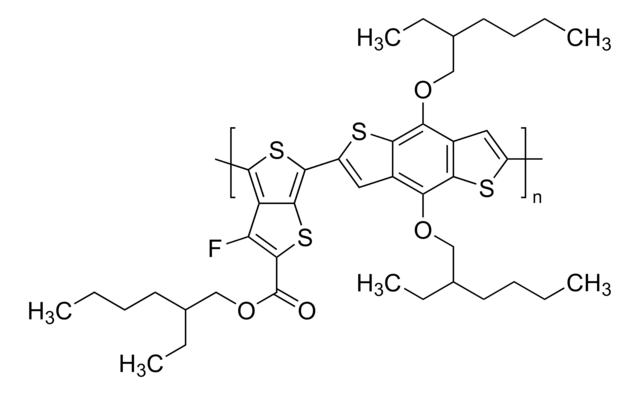445703
Poly(3-hexylthiophene-2,5-diyl)
regioregular
Sinonimo/i:
P3HT
About This Item
Prodotti consigliati
Livello qualitativo
PM
average Mw 50,000-100,000
Caratteristiche più verdi
Design for Energy Efficiency
Learn more about the Principles of Green Chemistry.
sustainability
Greener Alternative Product
Conducibilità
~103 S/cm (when doped with iodine)
Punto di fusione
238 °C
238 °C
Fluorescenza
λex 443 nm; λem 568 nm in chloroform
Energia dell’orbitale
HOMO 5 eV
LUMO 3 eV
Prestazioni di un dispositivo OPV
ITO/NiO/P3HT/PC61BM/LiF/Al
ITO/PEDOT:PSS/P3HT:PC61BM (1:08)/Al
Categoria alternativa più verde
Caratteristiche del semiconduttore
P-type (mobility=1E-4-1E-1 cm2/V·s)
Cerchi prodotti simili? Visita Guida al confronto tra prodotti
Descrizione generale
Applicazioni
Caratteristiche e vantaggi
Good processibility, environmental stability and electroactivity.
Confezionamento
Note legali
Rieke is a registered trademark of Rieke Metals, Inc.
Codice della classe di stoccaggio
11 - Combustible Solids
Classe di pericolosità dell'acqua (WGK)
WGK 3
Punto d’infiammabilità (°F)
Not applicable
Punto d’infiammabilità (°C)
Not applicable
Dispositivi di protezione individuale
dust mask type N95 (US), Eyeshields, Gloves
Certificati d'analisi (COA)
Cerca il Certificati d'analisi (COA) digitando il numero di lotto/batch corrispondente. I numeri di lotto o di batch sono stampati sull'etichetta dei prodotti dopo la parola ‘Lotto’ o ‘Batch’.
Possiedi già questo prodotto?
I documenti relativi ai prodotti acquistati recentemente sono disponibili nell’Archivio dei documenti.
I clienti hanno visto anche
Articoli
Flexible electronic circuits and displays based on organic active materials are future generations of products that may eventually enter mainstream electronics market.
PCBM-based n-type semiconductors - Find p- and n-type organic semiconductors available with PCBM library & properties.
Flexible electronic circuits, displays, and sensors based on organic active materials will enable future generations of electronics products that may eventually enter the mainstream electronics market.
The application of conducting polymers at the interface with biology is an exciting new trend in organic electronics research.
Il team dei nostri ricercatori vanta grande esperienza in tutte le aree della ricerca quali Life Science, scienza dei materiali, sintesi chimica, cromatografia, discipline analitiche, ecc..
Contatta l'Assistenza Tecnica.

![[6,6]-Phenyl C61 butyric acid methyl ester ≥99%](/deepweb/assets/sigmaaldrich/product/structures/359/221/d990c746-0960-4c69-bf76-fe09b193824d/640/d990c746-0960-4c69-bf76-fe09b193824d.png)






